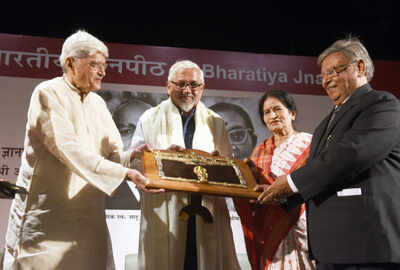
NEW DELHI: Celebrated author Amitav Ghosh received the prestigious Jnanpith Award in Delhi on Wednesday. The 54th edition of the award was also unique in one sense: for the first time in its long history spanning over half a century, it was presented to an author writing in English.
At an august gathering at the Stein Auditorium comprising authors, administrators, politicians and other eminent personalities from different fields, former West Bengal governor Gopalkrishna Gandhi presented the award to Ghosh.
Ghosh described his literary journey and remembered the people who influenced him. He recalled the late Nandita Jain telling him once that the award needs to be given to English language authors too, and maybe someday that would happen. "She would have been very happy today if she were alive," Ghosh said. He also fondly remembered the late Sunil Gangopadhyay, who had called his book, "The Hungry Tide", "a Bengali novel written in English".
Ghosh said India's linguistic plurality is something to celebrate. "English is not by any means my only language. Nor would my work be what it is if I had grown up in a circumstance where one language predominated over all others... My work has been shaped, formed and enabled by the linguistic diversity and pluralism of the circumstances in which I grew up," he said.
Ghosh also warned that even though the awards have stayed true to the principles of pluralism in relation to language, region and community, these principles will be sorely tested in the times to come as authors are increasingly feeling "embattled, beleaguered and marginalised" as "around the world minds are closing and horizons are narrowing".
Gandhi then delivered his address as chief guest, contrasting state awards with awards like Jnanpith that are "given by the society". "State awards get you ' shabbashi ' (applaud), but society awards get you ' shukriyaan ' (public gratitude). It is not ' alankaran ' (ornamentation) but an ' aalingan ' (embrace) of the people," Gandhi said in Hindi.
Lauding Ghosh's large body of work, Gandhi called him a "sailor among novelists" and a "philosopher of the environment". But he said that in India today, there is an environment of anger and hate. And he urged Ghosh, who recently authored "The Great Derangement", to write his next book on this environment of hate, on the "inflammable hatred among communities, which translates into mutually terrorising neighbours in the mohallas".
Gandhi said South Asia is sitting on a "powder keg of mutually annihilating fears and threats", and urged everyone to "save the India of Gautam Buddha and Vardhaman Mahavir from hate".
Pratibha Ray, chairperson of the selection board and a Jnanpith awardee herself, gave a brief history of the awards and told the audience why the award is an intimate part of the cultural milieu of India. She quoted Margaret Thatcher who, as the British Prime Minister, was the chief guest when the award was presented to Mahadevi Verma in 1983: "Bharatiya Jnanpith is like a great tree - its roots deeply embedded in the soil of your ancient culture - its branches and leaves symbolising the flourishing living tradition of Indian writers who are creating new works of literature in the languages of today."
The organisers, while felicitating Ghosh, also remembered the past greats who occupy the award's hall of fame, and especially Girish Karnad who passed away on Monday and who was an awardee in 1998. A minute of silence was observed in his memory.
At an august gathering at the Stein Auditorium comprising authors, administrators, politicians and other eminent personalities from different fields, former West Bengal governor Gopalkrishna Gandhi presented the award to Ghosh.
Ghosh described his literary journey and remembered the people who influenced him. He recalled the late Nandita Jain telling him once that the award needs to be given to English language authors too, and maybe someday that would happen. "She would have been very happy today if she were alive," Ghosh said. He also fondly remembered the late Sunil Gangopadhyay, who had called his book, "The Hungry Tide", "a Bengali novel written in English".
Ghosh said India's linguistic plurality is something to celebrate. "English is not by any means my only language. Nor would my work be what it is if I had grown up in a circumstance where one language predominated over all others... My work has been shaped, formed and enabled by the linguistic diversity and pluralism of the circumstances in which I grew up," he said.
Ghosh also warned that even though the awards have stayed true to the principles of pluralism in relation to language, region and community, these principles will be sorely tested in the times to come as authors are increasingly feeling "embattled, beleaguered and marginalised" as "around the world minds are closing and horizons are narrowing".
Gandhi then delivered his address as chief guest, contrasting state awards with awards like Jnanpith that are "given by the society". "State awards get you ' shabbashi ' (applaud), but society awards get you ' shukriyaan ' (public gratitude). It is not ' alankaran ' (ornamentation) but an ' aalingan ' (embrace) of the people," Gandhi said in Hindi.
Lauding Ghosh's large body of work, Gandhi called him a "sailor among novelists" and a "philosopher of the environment". But he said that in India today, there is an environment of anger and hate. And he urged Ghosh, who recently authored "The Great Derangement", to write his next book on this environment of hate, on the "inflammable hatred among communities, which translates into mutually terrorising neighbours in the mohallas".
Gandhi said South Asia is sitting on a "powder keg of mutually annihilating fears and threats", and urged everyone to "save the India of Gautam Buddha and Vardhaman Mahavir from hate".
Pratibha Ray, chairperson of the selection board and a Jnanpith awardee herself, gave a brief history of the awards and told the audience why the award is an intimate part of the cultural milieu of India. She quoted Margaret Thatcher who, as the British Prime Minister, was the chief guest when the award was presented to Mahadevi Verma in 1983: "Bharatiya Jnanpith is like a great tree - its roots deeply embedded in the soil of your ancient culture - its branches and leaves symbolising the flourishing living tradition of Indian writers who are creating new works of literature in the languages of today."
The organisers, while felicitating Ghosh, also remembered the past greats who occupy the award's hall of fame, and especially Girish Karnad who passed away on Monday and who was an awardee in 1998. A minute of silence was observed in his memory.
Download The Times of India News App for Latest India News.
more from times of india news
World Cup 2019
Trending Topics
More from TOI
Navbharat Times
Featured Today in Travel
Quick Links
Rajasthan election 2019Andhra Lok Sabha electionGujarat Election 2019Karnataka Election 2019MP Lok Sabha electionMaharashtra election 2019West Bengal Lok SabhaTamil Nadu election 2019UP Election 2019Bihar election 2019UP Election DateAndhra Election DateBihar Election DateAndhra Assembly ElectionLok SabhaMP Election DateMaharashtra Election DateShiv SenaYSRCPTDPWB Election DateJDUCongressBJP newsGujarat Election DateSC ST ActUIDAIIndian ArmyISRO newsSupreme CourtRajasthan Election DateTelangana Election DateTamilrockers 2018Uttarakhand newsSikkim newsOrrisa newsKarnataka Election DateNagaland newsSatta KingManipur newsMeghalaya news
Get the app









